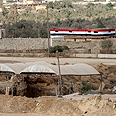
Revise peace treaty to uproot terrorism
Op-ed: Eradication of Sinai terror requires massive military presence in region
Until recently the Sinai Peninsula was a tourist paradise: A demilitarized area nearly empty of soldiers that symbolizes the peace between Israel and Egypt – with enchanting desert views and tropical beaches on which courteous Bedouins serve coffee. So how did it become a terrorist paradise?
In accordance with the Israel-Egypt peace treaty, the Sinai desert is a demilitarized area with a very limited number of soldiers securing it. This agreement, which is supposed to keep the border region quiet, has become very problematic in recent years. The lack of a significant Egyptian military presence has left a dangerous void in Sinai. Islamist terror groups became aware of the region's potential more than 10 years ago, and the financial means at their disposal have allowed them to strike deals with local Bedouin tribes – the real rulers of the desert.
The Bedouin tribes, who will do anything to get rich, including stealing organs from African refugees, serve as the foundation for the flourishing terror in Sinai. The Sinai terror threat has intensified since the establishment of Hamas' Islamist entity in Gaza in 2007. The tunnels and other secret passageways between the Strip and Sinai allow the terrorists to transfer arms and materials used to make bombs and missiles. It is safe to assume that trucks carrying humanitarian aid to Gaza's residents also carry a large amount of weapons. These weapons are meant not only for Hamas, but for other terror groups that do not submit to Hamas' authority.
Thus, a new situation has been created whereby Hamas police monitor the activity of local Islamist organizations in Gaza to prevent them from seizing control of the coastal enclave.
Since the Egyptian revolution erupted on January 25, 2011 on the heels of the Arab Spring, Egypt's control over Sinai has weakened significantly. The Egyptian army has been preoccupied with the developments in Egypt proper. According to the Washington Post, the Bedouins in Sinai purchased arms that were smuggled from Libya during the revolution – and now they plan to use these weapons against the Egyptian army.
'Tighten grip on Sinai'
Opposition elements in Egypt, such as the Coalition of the Youth of the Revolution, hold newly-elected President Mohamed Morsi responsible for the death of 16 Egyptian patrolmen during Sunday's terror attack south of Rafah. According to them, Morsi is responsible for the deteriorating security situation in Sinai. Since his election, Morsi has visited all of Egypt's sectors, except Sinai. The attack also embarrassed Hamas' Prime Minister in Gaza, Ismail Haniyeh, who met with Morsi in Egypt last week.
Haniyeh was quick to condemn the attack and declare that the attackers did not hail from Gaza. He said his regime would investigate, and stressed the need for increased cooperation between Gazan and Egyptian security forces. The attack undoubtedly undermined Hamas' achievements. Just last week Morsi promised Haniyeh that he would work to ease the Israeli blockade of the Strip and assist its Palestinian inhabitants.
The attack also underscored the conflict of interests between Hamas, which claims to represent the Palestinians, and global jihad organizations (as well as al-Qaeda), which consider both the Egyptian and Israeli armies as enemies of Islam.
The ease in which Israeli forces killed the terrorists once they breached the border with an armored vehicle they had seized during the attack on the Egyptian patrolmen led some Egyptians to claim that the assault was an Israeli conspiracy. They claimed on the Internet that Israel activates terror cells in Sinai to create a rift between Hamas and Egypt and tighten the siege on Gaza.
But Egypt is aware of the severity of the terror threat in Sinai and of the need for cooperation between the new government in Cairo and the army, as well as between Egypt and Israel. The Muslim Brotherhood movement, which condemned the attack, called on the Egyptian army to tighten its grip on Sinai.
However, the eradication of terror in Sinai will be possible only if the Israel-Egypt peace treaty is revised in such a way that would allow for the mobilization of forces from both sides of the border to fight the jihadists.
Dr. Yaron Friedman is a graduate of the Sorbonne. He teaches Arabic and lectures about Islam at the Technion, at Beit Hagefen and at the Galilee Academic College. His book, the Nusayri Alawis: An Introduction to the Religion, History and Identity of the Leading Minority in Syria, was published in 2010 by Brill-Leiden










